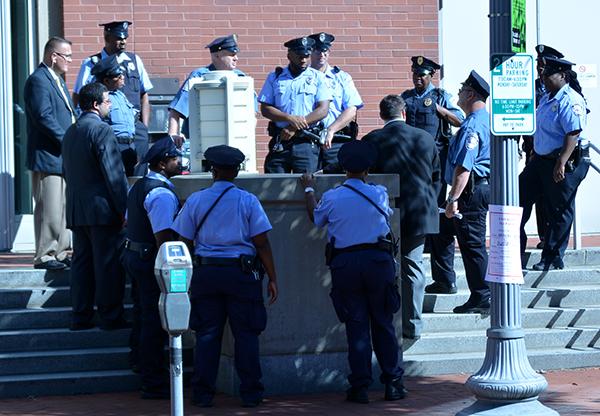Three discrimination complaints brought against campus police in the past six months could impact the department’s accreditation this winter, the head of the reviewing agency said.
If accreditation officials find that the complaints reflect a larger problem, GW’s police department could lose the outside agency’s stamp of approval. The accreditor plans to visit campus by early December, and will spend a month evaluating the department’s procedures, training programs and interactions with the public.
W. Craig Hartley Jr., the executive director of the Commission on Accreditation for Law Enforcement Agencies, said during the accreditation process, the organization would consider legal action taken against a department if it did not follow its own policies when dealing with the cases.
“We tend not to look at it as a hammer on agencies,” Hartley said. “It’s not a process to go, ‘Gotcha, gotcha, gotcha.’”
He said he could not yet comment on GW specifically, but that in general accreditors would look for trends in any current lawsuits.
CALEA last tested UPD three years ago. Since 2010, at least five officers have filed complaints against the department for gender, race or age discrimination.
This year will mark the fourth time the department goes through the accreditation process in eight years, and the University will know if it has met the commission’s standards by early spring.
CALEA has certified about 51 college police departments nationwide. UPD and the U.S. Capitol Police are the only two D.C. police departments with the certification, according to the organization’s website.
Senior Associate Vice President for Safety and Security Darrell Darnell said in an interview last week that UPD’s consistent re-accreditation shows the strength of their policies.
“We may have taken some advice that they’ve given us, but we’ve done a pretty good job,” he said.
CALEA has a specific set of standards for college police departments, Hartley said, focusing on whether they meet the requirements of the Clery Act. That federal law requires universities to report crime data and alert the community when incidents like sexual assaults are reported on campus.
Hartley said accreditors focus on how the department operates as a whole. They will observe officers while they are on-duty, review the department’s daily procedures and speak to members of the community about their experiences with campus police.
Mark Wynn, a campus safety and security consultant, said several ongoing lawsuits can put added stress on any police department as they go through the accreditation process.
“An accredited police department can still have trouble if you don’t have the right leadership,” Wynn said. “It could be you could have a great police department that does great work and gets sued, or you could have some internal labor issues, which is another level of liability that police managers have to worry about.”
If an accreditation agency finds a police department at fault in a lawsuit, it could lose its certification, said W. Scott Lewis, a partner at the National Center for Higher Education Risk Management, a campus safety consulting firm.
“Certainly anything that may be overtly discriminatory may put that in jeopardy,” he said.
The commission uses public forums to learn about police interactions with the general public. Past town halls have drawn only handfuls of GW community members.
Hartley said students, faculty, staff and neighbors will also be able to reach out to CALEA by calling its national phone number, or through a telephone session for the area.
“As you know, sometimes it’s difficult to get residents out, but we still think that’s of value,” Hartley said.
Darnell said the commission wouldn’t seek out specific members of the GW community to interview.
“It’s just random,” he said. “They don’t want it to be a canned thing.”






